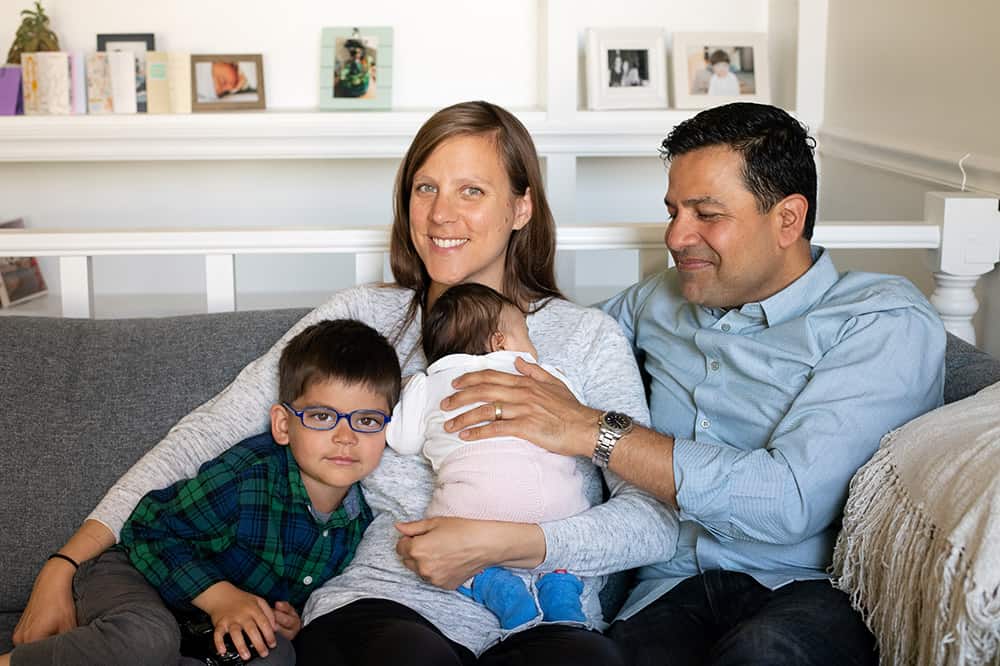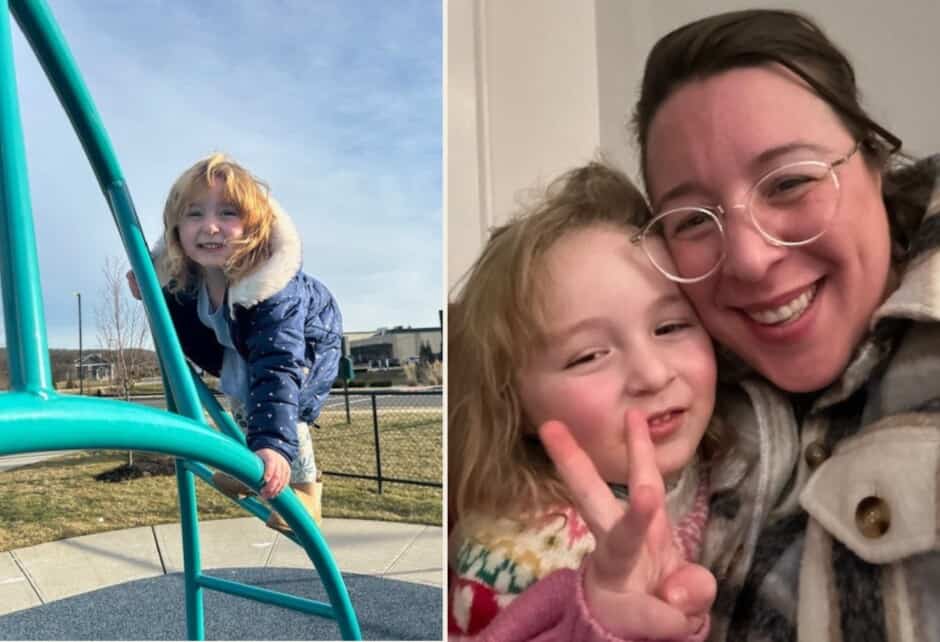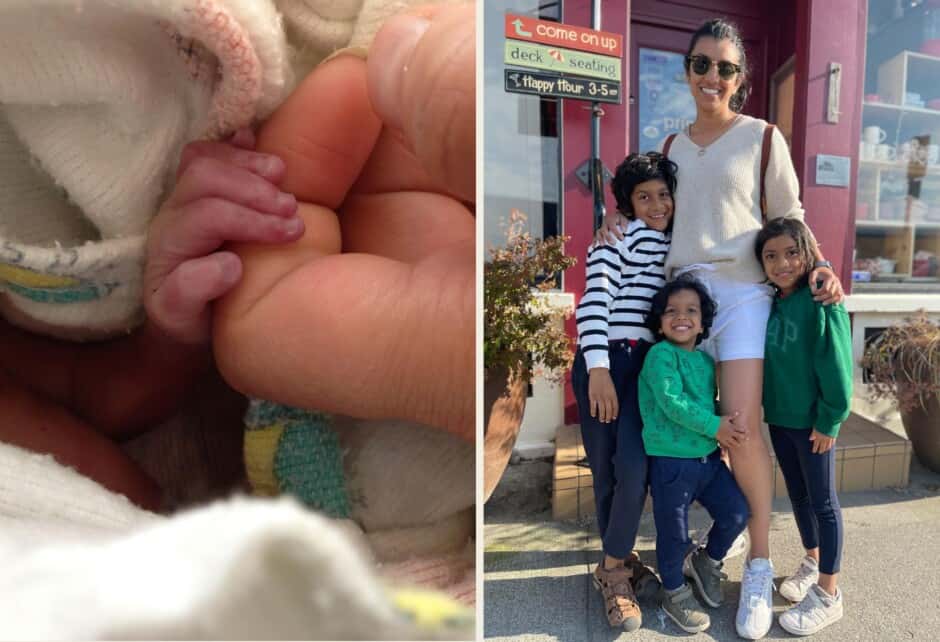
Mom Talk: My Daughter Died. Here’s What I Tell Her Siblings
Written by Alysia Cirona-Singh
Photography by Photo By Katherine Fiordalis
October is Pregnancy, Infant, & Child Loss Awareness Month, and all month long we will be bringing you essays from mothers who have experienced this devastation first-hand. Today’s story comes from mother of three and San Francisco-based psychiatrist Alysia Cirona-Singh, who tragically lost her middle child—a daughter, Esme—to cancer. Below, she explains how she’s talking to her surviving children about the death of their sibling in order to build understanding and resilience, and honor Esme’s memory.
“Do you remember the time before Isla was here?” I asked my four-year-old son Enzo at dinner one evening in 2019. Isla was three months old, sitting in her father’s lap and looking at her hands with wonder as the three of us ate veggie burgers and fries. We had been talking about how hard it can be to have a baby in the house, a frequent topic of conversation those days.
“Nope,” he replied.
“It’s hard to remember not having her.”
“But Esme was here,” he says. Esme is our middle child who died from cancer two years earlier.
“Yes, she was. Until she got sick. Do you remember that?”
“Yeah. Then she went to the hospital. Then what happened?” Although he knew the story, he sometimes asked to hear it again.
“She died there, we didn’t get to bring her home.” Esme died when she was nine months old, less than a month after being diagnosed with an extremely rare tumor.
He waited a beat, chewing his French fry, looking thoughtful. “How do they die?” His tone was light.
“Well, her heart and lungs stopped working, because she had cancer. So she died.” I watched him carefully and waited for a follow up question, tears, something.
Instead, he said, “Papa! Eat your French fries!” He was ready to move on to more pressing matters.
These types of exchanges are common in our house. Esme is physically absent, but her presence remains strong as she is woven into our daily lives through conversations like these.
When it became clear that Esme would not survive her diagnosis, I felt nearly as scared for Enzo as I did for her. In addition to overwhelming misery as I watched my daughter die, I was consumed by worries about Enzo. How does a child as young as Enzo understand death? How can I possibly talk to him about it? If we have other children, how will they understand having a sister whom they’ve never met? How will I take care of him when I am consumed by grief?
Immediately after Esme died, friends frequently offered to help us take care of Enzo. “Let me take him off your hands for a few hours,” they would say. I appreciated the generosity underlying these gestures, but I found that taking care of him was not a burden I wanted relief from. On days that I otherwise would have been unable to move, for him, I had to get up. I had to eat. I had to keep putting one foot in front of the other. He united my husband and me in moments of joy when we were both drowning in our own individual pools of grief. A year and a half after Esme died, Isla was born. She is 16 months old now, and can identify Esme in pictures we have around the house, pointing with her chubby finger. Although my grief for Esme has not diminished, my life has grown bigger.
While I certainly do not have all of the answers, here are some concepts I have relied upon over the past three years that have helped me parent her siblings.
First, answer the question that is asked. I often over-explain when the topic at hand is fraught. For example, it was over a year after Esme died before Enzo thought to ask what happened to her body. She was cremated. Because I was scared that Enzo would be terrified by imagining his baby sister burned, my first instinct was to start talking about how her body wasn’t the same thing as her; that it was part of who she was when she was alive, but after she died, her body was left behind. The last thing I wanted to do was tell him that her body was put in a large oven and burned to ash. But he was three years old, and he hadn’t asked me to philosophize about her soul. So I took a deep breath, and said “Her body was cremated.” That was enough. He was not afraid, and he did not have nightmares. He just needed his question answered.
Second, and related to the first, is to provide pediatric doses of the truth. As Enzo has grown older, his vocabulary has grown and he has an increasing ability to think about more abstract concepts. The details and types of answers we give Enzo now are different from what we told him two years ago, from what we say to Isla, and from what we will tell both of them 10 years from now, but we always tell them the truth, even when it would be easier in the moment not to. This includes using language that is accurate. We say died, not passed away or lost.
Finally, I consider her death an inoculation for my children against future losses. They will face other difficulties in their lives—heartbreak, failures, and, yes, the death of people they love. But if they have had the experience that they will not be alone with profound grief and sadness, if somewhere deep in their psyches it is imprinted that painful events can be talked about and understood, then they will have a deep sense of being able to survive. This is where resilience lies.
Before my daughter died, I envisioned that protecting my children meant shielding them, standing forever vigilant at the threshold of their lives, sword raised. But sometimes, that is not possible, and harm finds its way to them. Now, I imagine that safety comes in the form of standing beside them, helping them build their own sword, piece by piece, from the rubble of their own tragedies.
Are you a mom with something to say? Send us an email to be considered for our “Mom Talk” column.
Write a Comment
Share this story




I thank you deeply for sharing your wisdom, borne of such pain. For all of us, thank you.
Thank you for sharing your family’s story. What a beautiful tribute to Esme. I’m so sorry you suffered such a tragedy.